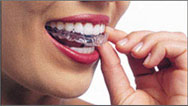Frequently Asked Questions
Do I really have to go to the dentist every six months?
How often you go for a dental exam depends on your oral health needs. The goal is to catch small problems early. For many people, this means a dental exam every six months. Your dentist may suggest that you visit more or less often depending on how well you care for your teeth and gums, problems you have that need to be checked or treated, how fast tartar builds up on your teeth, and so on.
Do I need x-rays at each visit?
How often you need to have x-rays also depends on your oral health. A healthy adult who has not had cavities or other problems for a couple of years probably won't need x-rays at every appointment. If your dental situation is less stable and your dentist is monitoring your progress, you may require more frequent x-rays.
What is fluoride? How does it prevent tooth decay? Where can I get fluoride treatments?
Fluoride is a mineral found in soil, water (both fresh and salt) and various foods. It has a positive effect on oral health by making teeth more resistant to decay. Fluoride can also prevent or even reverse tooth decay that has started.
For some Canadians, fluoride is in public drinking water, however many communities are choosing to discontinue this additive. Fluoride toothpastes and rinses are available for purchase, and your dentist can provide professional fluoride products such as gels and varnish.
When should I take my child to the dentist for the first time?
It's important to get an early start on dental care, so that your child will learn that visiting the dentist is a regular part of health care.
Teaching your child about regular dental care should begin at home. Start cleaning your child's mouth with a soft damp cloth before teeth come in and continue with a soft toothbrush once he or she has a first tooth.
The first visit to the dentist needs to be a positive experience for your child - one reason why it's best to visit before a problem develops. If you think there is a problem, however, take your child to the dentist right away, no matter what age.
If you are a nervous dental patient, ask your spouse or another family member to take the child for the appointment. If your child senses that you are nervous, he or she may feel nervous too. When you talk to your child about going to the dentist, explain what will happen. Do not say things like "it won't hurt" or "don't be scared."
How can I tell if I'm brushing and flossing properly?
Brushing: Brush your teeth gently, paying special attention to the areas where your teeth and gums meet. Clean every surface of every tooth. Use the tip of your brush to clean behind your upper and lower front teeth.
Flossing: Take a piece of floss about 18 inches long and wrap it around your middle fingers. Using a clean section of floss each time, wrap the floss into a C shape around a tooth. Wipe it over the tooth, from base to tip, a couple of times. Repeat on each tooth.
The dentist can also help you by showing you proper techniques to make sure you are cleaning your teeth thoroughly. The dentist can also answer questions about the proper toothbrush, toothpaste, floss or other dental care items that are available for purchase.
Why doesn't my dental benefits plan cover my treatment?
Dental plans, offered by many employers, are a means to help you pay for your dental treatment. Carriers reimburse patients based on the level of coverage decided by the patient's employer.
When you visit the dentist, it's the dentist's responsibility to make a treatment plan based on your oral health needs. Your needs may be different from what is covered by your dental plan. It is your right to decide whether or not to go ahead with any treatment.
You should not decide based on what your plan covers. If you agree to have the treatment, it's your responsibility to pay for it. It is the responsibility of the benefits carrier to reimburse you for the amount covered by your dental plan.
The good news is that you can avoid costly dental treatment by brushing, flossing and visiting your dentist for a regular check-up. Regular dental exams cost money, but they are less expensive than fixing serious dental problems that stem from neglect.
My dentist is recommending treatment (I know nothing about). What should I do?
Ask questions. It sounds simple enough, but sometimes we feel embarrassed to ask simple questions. There is no need to feel that way. You will feel much better, and be able to make a better decision, if you understand the dental procedure that is recommended to you. If you don't say anything, your dentist may think that you already understand.
The final decision about how and when to proceed with any treatment is yours. To help you understand what is involved in the treatment, your dentist may give you some printed material to read.
If you have already left the dental office without asking questions, call back later. Be careful about getting information from unknown sources, including sources on the Internet. Some of this information may not be reliable.



